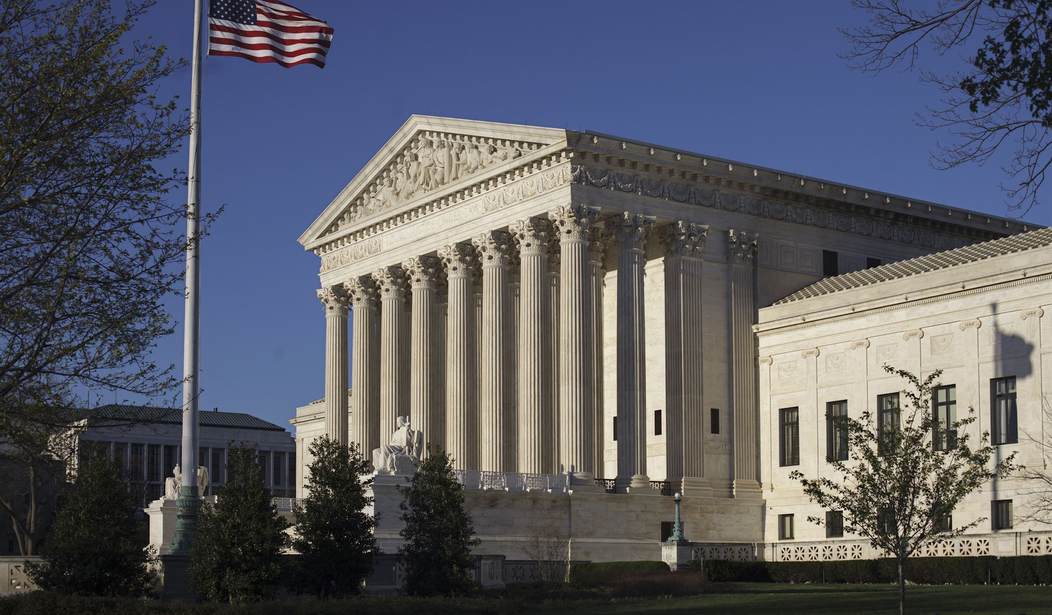We knew Friday was going to be a big day SCOTUS-wise. The remaining cases for the term have been highly anticipated and promise to have significant reverberations across the American landscape. As we learned Thursday, the Court added one more decision day to the calendar (Monday), so we have more to look forward to through the weekend.
As for Friday's decisions, there were three — all split decisions. Two of the three were along party lines, but one had Justice Ketanji Brown Jackson siding with the conservative majority and Justice Amy Coney Barrett writing the dissent, in which Justices Sonia Sotomayor and Elena Kagan joined.
Supreme Court Rules Homeless Do Not Have a Right to Camp on Public Property
BREAKING: Supreme Court Issues Monumental Ruling on Chevron Deference
Supreme Court Hands Down Blockbuster Ruling in Case
That Will Impact Multiple J6 Defendants
The Supreme Court Firebombs the Administrative State
and Tells Congress to Get Off Its Butt and Work
June 28, 2024 Decisions
Loper Bright Enterprises v. Raimondo (consolidated with Relentless v. Department of Commerce)
Date: June 28, 2024
Author: Roberts
Split: 6-2/6-3 (Jackson recused from Loper)
Dissent: Kagan, Sotomayor, Jackson (as to Relentless)
Appeal From: D.C. Circuit, First Circuit
Basic Facts:
The Court granted certiorari in these cases limited to the question whether Chevron U. S. A. Inc. v. Natural Resources Defense Council, Inc., 467 U. S. 837, should be overruled or clarified. Under the Chevron doctrine, courts have sometimes been required to defer to “permissible” agency interpretations of the statutes those agencies administer—even when a reviewing court reads the statute differently. Id., at 843. In each case below, the reviewing courts applied Chevron’s framework to resolve in favor of the Government challenges by petitioners to a rule promulgated by the National Marine Fisheries Service pursuant to the Magnuson-Stevens Act, 16 U. S. C. §1801 et seq., which incorporates the Administrative Procedure Act (APA), 5 U. S. C. §551 et seq.
Additional Background (via streiff):
In 1972, Congress passed the Magnuson-Stevens Fishery Conservation and Management Act, "to respond to the threat of overfishing and to promote conservation.” As part of that law, eight regional fisheries councils were created. Each of those councils, which is a business association, is charged with producing a fisheries management plan. Under the plan created for New England herring fisheries, half of all fishing trips had to carry a federal monitor. Originally, all the observers were employed by the federal government. Somehow, the National Marine Fisheries Service managed to lose money from its budget as the rest of the federal government porked up. In 2020, the management plan required the fishing boats to pay for monitors reporting to the federal government. The cost was over $700. Many fisheries complained that this additional expense resulted in zero profit or even a loss for a day's fishing.
Congress didn't authorize billing private fishing companies to pay for federal monitors. But the Department of Commerce interpreted the requirement that it may “require that one or more observers be carried on board a vessel of the United States engaged in fishing for species that are subject to the plan, for the purpose of collecting data necessary for the conservation and management of the fishery,” to mean that half the fishing boats had to carry deadweight that they paid for.
- Whether the Court should overrule Chevron or at least clarify that statutory silence concerning controversial powers expressly but narrowly granted elsewhere in the statute does not constitute an ambiguity requiring deference to the agency.
- Whether the phrase "necessary and appropriate" in the MSA augments agency power to force domestic fishing vessels to contract with and pay the salaries of federal observers they must carry.
Holding: Vacated and remanded.
The Administrative Procedure Act requires courts to exercise their independent judgment in deciding whether an agency has acted within its statutory authority, and courts may not defer to an agency interpretation of the law simply because a statute is ambiguous; Chevron is overruled.
Skinny: Agencies don't get the final say in interpreting the scope of their own power; courts do. (A big win in pushing back against the sprawling administrative state.)
Note: This pairs nicely with SEC v. Jarkesy, decided Thursday.
Date: June 28, 2024
Author: Roberts
Split: 6-3
Dissent: Barrett, Sotomayor, Kagan
Appeal From: D.C. Circuit
Basic Facts:
The Sarbanes-Oxley Act of 2002 imposes criminal liability on anyone who corruptly “alters, destroys, mutilates, or conceals a record, document, or other object, or attempts to do so, with the intent to impair the object’s integrity or availability for use in an official proceeding.” 18 U. S. C. §1512(c)(1). The next subsection extends that prohibition to anyone who “otherwise obstructs, influences, or impedes any official proceeding, or attempts to do so.” §1512(c)(2). Petitioner Joseph Fischer was charged with violating §1512(c)(2) for his conduct on January 6, 2021. On that day, Congress convened in a joint session to certify the votes in the 2020 Presidential election. While they did so, a crowd of supporters of then-President Donald Trump gathered outside the Capitol, and some eventually forced their way into the building, breaking windows and assaulting police. App. 189. This breach of the Capitol delayed the certification of the vote. The criminal complaint alleges that Fischer was among those who invaded the building. Fischer was charged with various crimes for his actions on January 6, including obstructing an official proceeding in violation of §1512(c)(2). He moved to dismiss that charge, arguing that the provision criminalizes only attempts to impair the availability or integrity of evidence. The District Court granted his motion in relevant part. A divided panel of the D. C. Circuit reversed and remanded for further proceedings.
Did the D.C. Circuit err in construing 18 U.S.C. § 1512(c) (“Witness, Victim, or Informant Tampering"), which prohibits obstruction of congressional inquiries and investigations, to include acts unrelated to investigations and evidence?
Holding: Vacated and remanded.
To prove a violation of §1512(c)(2), the Government must establish that the defendant impaired the availability or integrity for use in an official proceeding of records, documents, objects, or other things used in an official proceeding, or attempted to do so.
Skinny: This particular law (designed primarily for financial crimes) applies to evidence tampering, like destroying records, that interferes with an official proceeding. It does not apply to trespassing, engaging in disorderly conduct, or getting into a physical confrontation with law enforcement. In a nutshell, while other charges against the defendant may be valid, the one under §1512(c)(2) was not.
Note: This ruling will impact more than 300 January 6 defendants. It could also have an impact on Special Counsel Jack Smith's D.C. prosecution of former President Donald Trump, as it lies at the heart of two of the four charges against him in that case.
City of Grants Pass, Oregon v. Johnson
Date: June 28, 2024
Author: Gorsuch
Split: 6-3
Dissent: Sotomayor, Kagan, Jackson
Appeal From: Ninth Circuit
Basic Facts:
Grants Pass, Oregon, is home to roughly 38,000 people, about 600 of whom are estimated to experience homelessness on a given day. Like many local governments across the Nation, Grants Pass has public camping laws that restrict encampments on public property. The Grants Pass Municipal Code prohibits activities such as camping on public property or parking overnight in the city’s parks. See §§5.61.030, 6.46.090(A)–(B). Initial violations can trigger a fine, while multiple violations can result in imprisonment. In a prior decision, Martin v. Boise, the Ninth Circuit held that the Eighth Amendment’s Cruel and Unusual Punishments Clause bars cities from enforcing public-camping ordinances like these against homeless individuals whenever the number of homeless individuals in a jurisdiction exceeds the number of “practically available” shelter beds. 920 F. 3d 584, 617. After Martin, suits against Western cities like Grants Pass proliferated.
Plaintiffs (respondents here) filed a putative class action on behalf of homeless people living in Grants Pass, claiming that the city’s ordinances against public camping violated the Eighth Amendment. The district court certified the class and entered a Martin injunction prohibiting Grants Pass from enforcing its laws against homeless individuals in the city. App. to Pet. for Cert. 182a–183a. Applying Martin’s reasoning, the district court found everyone without shelter in Grants Pass was “involuntarily homeless” because the city’s total homeless population outnumbered its “practically available” shelter beds. App. to Pet. for Cert. 179a, 216a. The beds at Grants Pass’s charity-run shelter did not qualify as “available” in part because that shelter has rules requiring residents to abstain from smoking and to attend religious services. App. to Pet. for Cert. 179a–180a. A divided panel of the Ninth Circuit affirmed the district court’s Martin injunction in relevant part. 72 F. 4th 868, 874–896. Grants Pass filed a petition for certiorari. Many States, cities, and counties from across the Ninth Circuit urged the Court to grant review to assess Martin.
Does the enforcement of generally applicable laws regulating camping on public property constitute "cruel and unusual punishment" prohibited by the Eighth Amendment?
Holding: Reversed and remanded.
The enforcement of generally applicable laws regulating camping on public property does not constitute “cruel and unusual punishment” prohibited by the Eighth Amendment.
Skinny: Homelessness sucks, but it's still okay for states, cities, and municipalities to ban camping on public property. Put another way: "Sorry, folks, park's closed. Moose out front shoulda told ya."
You can check out prior installments of The Skinny on SCOTUS series, here.
For more up-to-date news on key court cases and legal analysis, please consider upgrading to a VIP account. VIP status will open a plethora of stories and podcasts here at RedState. And remember that a Gold-level account gets you access to all of our sister sites in Townhall Media: PJ Media, Twitchy, Hot Air, Bearing Arms, and Townhall.com. Today, we're running a massive sale: Use promo code USA60 for a 60% discount.















Join the conversation as a VIP Member